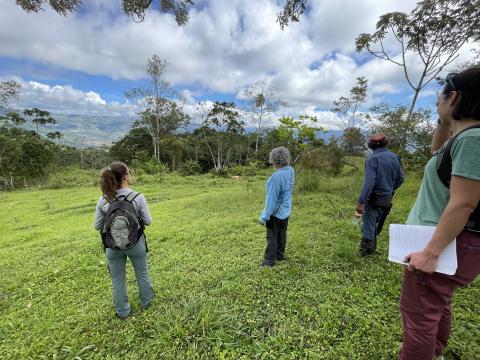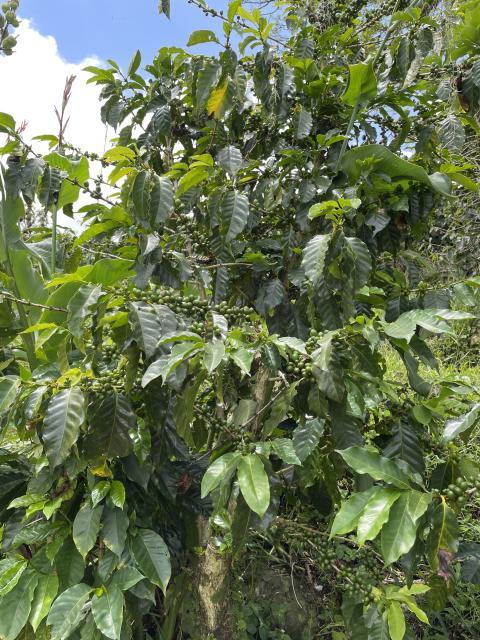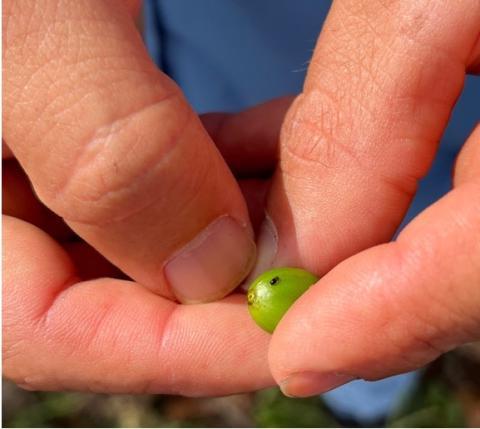
斯蒂芬妮, Katie (a co-author on the project), with their translator/guide and coffee producers; the producers are showing them around their coffee farm in Turriabla, 哥斯达黎加
Dr. 斯蒂芬妮·布罗克 是大学的助理教授 彼得T. Paul College of Business and Economics whose research focuses on how interactions between people and the environment can create economic inefficiencies that produce negative impacts on sustainability. In spring of 2023, 布罗克 received funding through the 联合国大学可持续发展奖 program which supported a fieldwork trip to 哥斯达黎加 to conduct research on the sustainable production of coffee and similar products within agroforestry systems. 在旅途中, 布罗克, 与持份者接触, 参观了农场, and directly engaged with farmers to learn about their decision-making processes and what constraints and barriers exist with respect to use of sustainable production techniques (e.g., time, money, knowledge), especially amid climate stressors, pest infestations, and plant diseases.
What keeps you excited and hopeful about sustainability in your work?

近距离观察咖啡树.
What is most exciting to me about sustainability research is the growing recognition that solutions to sustainability problems require accounting for and understanding the interdependencies between human systems and natural environments.
This acknowledgement that interdisciplinary research is valuable and necessary gives me hope that together we can tackle difficult sustainability issues.
具体地说, 在我的工作中, I can show that if small agricultural producers in less-developed economies account for pest-control services provided by biodiversity they can increase productivity and income through their labor decisions; this result supports the notion that producing in environmentally sustainable ways may have unexpected economic benefits and could not have been shown if this research was being done in the silo of economics alone.
Tell us about your fieldwork trip to 哥斯达黎加.

仔细观察咖啡蛀虫 咖啡浆果上的甲虫.
The motivation for this specific research comes from a case study of coffee producers in less-developed economies, 比如哥斯达黎加, who are dealing with controlling a pest – the coffee berry borer – that can decimate their product yield. The pest can be controlled by humans (e.g., through sprays or traps) or by natural predators (e.g., birds or ants that prey on the pest), but availability of natural predators is inherently dependent on biodiversity and landscape characteristics, such as forest or forest fragments. During our trip we engaged with a diverse set of stakeholders, 包括本地研究人员, 生态学家, 分销商, 最重要的是, 咖啡农. We wanted to hear directly from farmers about the challenges they are facing in effectively controlling the pest and their perceptions regarding the efficacy of natural predators, while visually inspecting the landscape they are operating in. It was important that we understood the economic and environmental barriers they face when treating the pest to ensure that our suggested solutions to the problem are actually viable in a bioeconomic sense.

Dr. 布罗克曼博士. 凯瑟琳·D. 李, a co-author on the coffee research and Associate Professor in Agricultural Economics at University of Idaho, learning about cocoa pods and beans.
How did the trip help advance your work?
前往 哥斯达黎加 让我们 to speak with the farmers directly and 给了 外部验证 to our research question and approach. It also advanced my work because I was introduced to a different product – cocoa beans used to produce chocolate – that has many parallels to coffee production and that needs research support as well. So, the trip helped me develop new research projects and collaborations too.
你下一步的研究是什么?
在理想的情况下, I would like to expand this work to do a more formal and broad survey of farmers in many less-developed economy settings about a variety of agroecosystem issues, including mitigating climate change, 重新造林的可行性, and valuing additional benefits to biodiversity.
